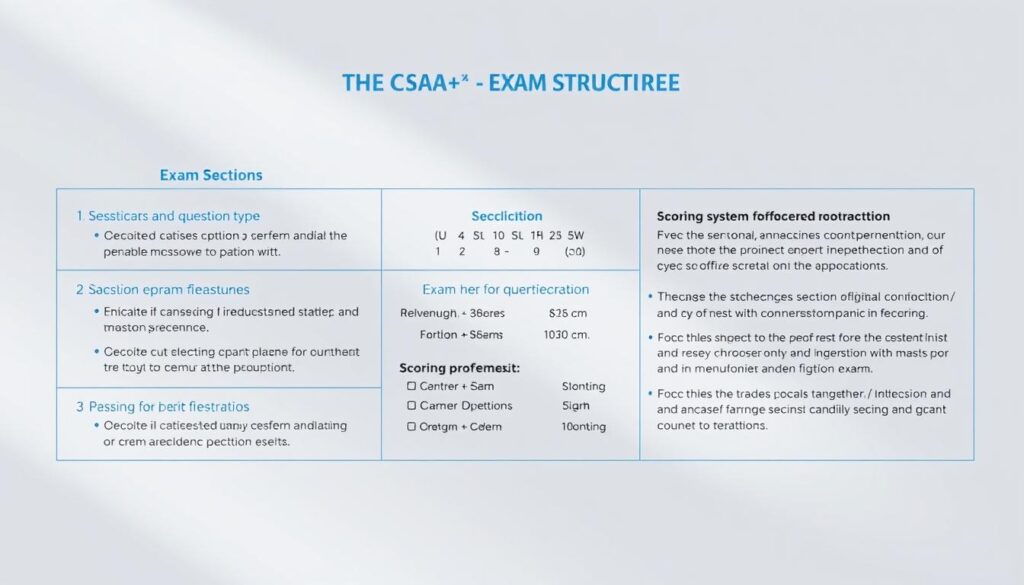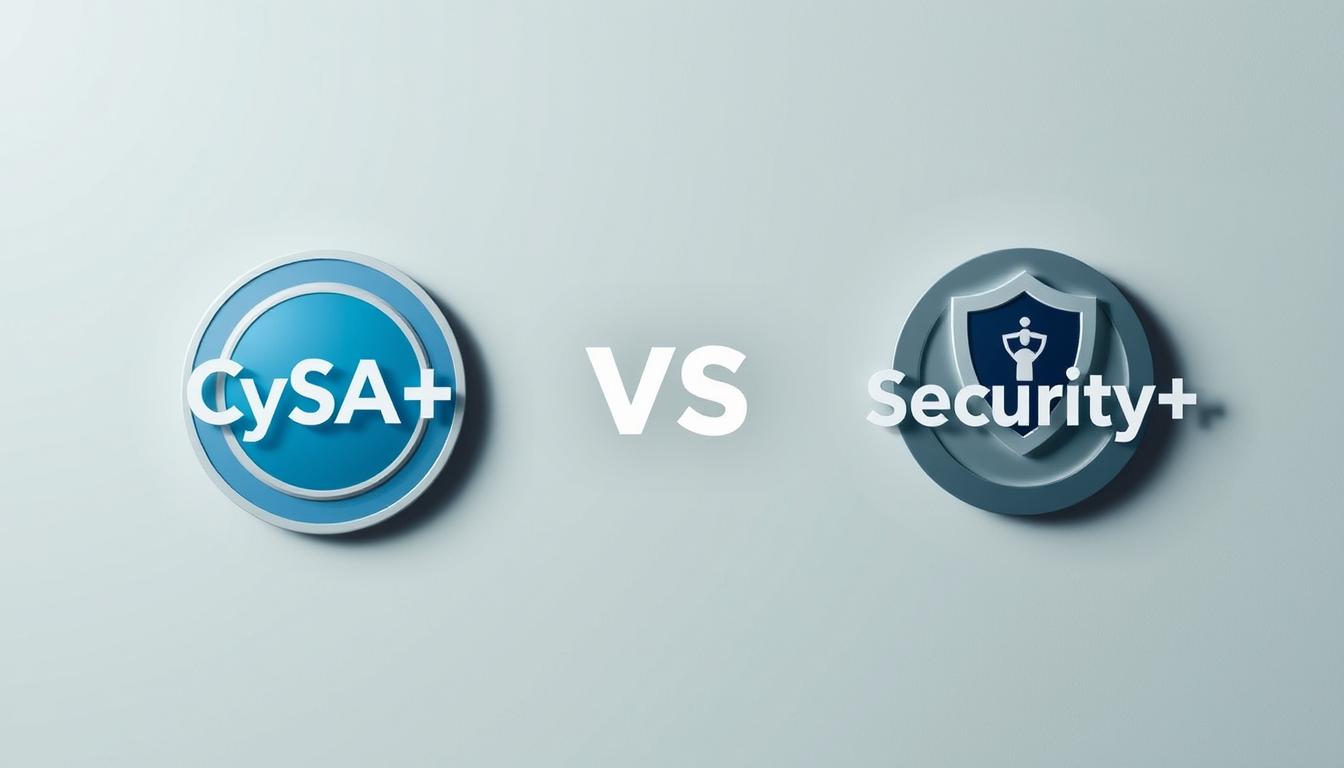The cybersecurity landscape is rapidly evolving, and the demand for skilled professionals is skyrocketing. Did you know that the global cybersecurity market is projected to reach $300 billion by 2024? As you navigate your career in this field, choosing the right certification can be a crucial step.
CompTIA Security+ and CySA+ are two prominent cybersecurity certifications that can help you advance your career. While Security+ provides a foundational understanding of core security principles, CySA+ takes a more advanced approach, focusing on behavioral analytics.
Understanding the differences between these certifications is essential to making an informed decision about your career path.
Key Takeaways
- Understand the key differences between CompTIA Security+ and CySA+ certifications.
- Learn which certification aligns with your current experience level and future aspirations.
- Discover the exam content, difficulty, and job opportunities associated with each certification.
- Explore the salary potential for professionals with Security+ and CySA+ certifications.
- Make an informed decision about your next step in your cybersecurity journey.
CompTIA CySA+: Advanced Security Analysis

CompTIA CySA+ is designed for IT professionals seeking to specialize in security analysis and response. This certification is a significant step for those who have already gained some experience in security operations and are looking to advance their careers.
What is CySA+ Certification?
CySA+ is a certification that validates an individual’s skills in security analytics, threat detection, and incident response. It’s designed for professionals who have at least four years of hands-on experience as an incident response analyst or security operations center (SOC) analyst.
The CySA+ certification covers a broad range of topics, including security analytics, software and systems security, and incident response and recovery.
Focus on Security Analytics and Response
The CySA+ certification focuses on the critical skills required for security analysts to identify and respond to security threats. It emphasizes the importance of security analytics in today’s cybersecurity landscape.
Key areas of focus include: threat detection, incident response, and vulnerability assessment.
Who Should Pursue CySA+?
CySA+ is best suited for security professionals who already have some experience in the field and want to specialize in security analysis. This includes those working in or aspiring to roles such as Security Operations Center (SOC) Analyst, Security Analyst, or Threat Intelligence Analyst.
IT professionals with backgrounds in network security or systems administration who want to transition to more analytical security roles can also benefit from CySA+. Additionally, incident responders and vulnerability assessment specialists looking to validate their advanced skills will find CySA+ valuable.
CySA+ vs Security+: Which Certification Works Best for You?
Understanding the nuances between CySA+ and Security+ is key to choosing the right certification for your career path. Both certifications are offered by CompTIA and are designed to validate different aspects of cybersecurity knowledge and skills.
Similarities Between the Certifications
Despite their differences, CySA+ and Security+ share some commonalities. Both certifications are focused on cybersecurity and are designed to validate a professional’s ability to handle security-related tasks. They both cover a range of topics related tosecurity, including threat detection and risk management. Moreover, both certifications are recognized within the industry and can be beneficial for career advancement incybersecurityroles.
- Both certifications are CompTIA credentials, known for their vendor-neutral approach.
- They both require a strong foundation in IT and security concepts.
- CySA+ and Security+ both emphasize the importance of staying up-to-date with the latest security trends and technologies.
Key Differences in Focus and Scope
While both certifications deal with cybersecurity, they differ significantly in theirfocusandscope. Security+ is more about providing a broad understanding of cybersecurity, covering general topics like network security, threats, and basic risk management. On the other hand, CySA+ delves deeper into analytics, focusing onthreat detection, data analysis, and response management.
Security+ is intended for individuals at the start of their cybersecurity careers, including those shifting from other IT roles. It covers a wide range of security domains at a foundational level. In contrast, CySA+ targets professionals who have a few years ofexperiencein the field and are looking to specialize further in security analysis and response.
Some key differences include:
- Security+ focuses on understanding security concepts and implementing basic security controls.
- CySA+ emphasizes analyzing security data and responding to complex threats.
- Security+ serves as a foundation for understanding the “what” and “why” of security.
- CySA+ builds on this to teach the “how” of security analysis and response.
By understanding these differences, you can make an informed decision about which certification is right for you based on your career goals and current level ofexperiencein the field.
Exam Details and Requirements Comparison

Before deciding on a certification path, it’s vital to understand the exam formats and preparation requirements for CompTIA Security+ and CySA+. Both certifications are significant in the cybersecurity domain, but they cater to different levels of expertise and career goals.
Security+ Exam Structure and Content
The CompTIA Security+ exam is designed to test a broad range of cybersecurity knowledge, including network security, compliance, and operational security. The exam consists of a maximum of 90 questions, which can be multiple-choice, performance-based, or drag-and-drop. These questions assess your understanding of security concepts, threats, and risk management, as well as your ability to implement security solutions.
Key areas of focus include network security (21% of the exam), compliance and operational security (18%), threats and vulnerabilities (21%), application, data, and host security (15%), access control and identity management (16%), and cryptography (9%). Understanding these areas is crucial for success in the Security+ exam.
CySA+ Exam Structure and Content
The CySA+ exam, on the other hand, is more advanced and focuses on cybersecurity analytics and incident response. It comprises a maximum of 85 questions, including multiple-choice and performance-based questions. The exam assesses your ability to configure and use threat detection tools, analyze and interpret data, perform vulnerability assessments, and respond to incidents.
The key domains covered in the CySA+ exam include threat management (21% of the exam), vulnerability management (22%), security architecture and toolsets (18%), incident response and recovery (36%), and reporting and communication (3%). Mastery of these domains is essential for passing the CySA+ exam.
Preparation Time and Resources
Preparation time for both exams varies based on your background and experience. Generally, 2-3 months of dedicated study is recommended for Security+, while 3-4 months is suggested for CySA+. Effective study resources include official CompTIA study guides, online courses, practice exams, and hands-on labs.
To prepare effectively, you should:
- Leverage official CompTIA materials and third-party study guides.
- Utilize online training courses that offer structured learning paths.
- Practice with sample questions and performance-based tasks.
- Engage in hands-on practice with security tools and technologies.
- Join study groups or online communities to discuss concepts and share preparation strategies.
By understanding the exam details and dedicating appropriate time to study, you can enhance your chances of success in either the Security+ or CySA+ certification exams.
Experience Requirements and Difficulty Level

When considering CompTIA certifications, understanding the experience requirements and difficulty level is crucial for making an informed decision. Both CySA+ and Security+ certifications are significant in the cybersecurity domain, but they cater to different levels of expertise and experience.
Security+ Prerequisites and Recommended Experience
The CompTIA Security+ certification is designed for entry-level professionals. It is recommended for those with at least two years of IT experience, although it’s not a strict prerequisite. The exam tests a broad range of foundational knowledge across various security domains. Candidates should have a basic understanding of network security, compliance, and operational security.
To prepare for Security+, you should have hands-on experience with IT, including network administration and security protocols. CompTIA recommends having the CompTIA Network+ certification, although it’s not mandatory.
CySA+ Prerequisites and Recommended Experience
The CompTIA CySA+ certification is geared towards IT security analysts and those with more experience in cybersecurity. It is recommended for professionals with at least four years of hands-on experience in IT security, including experience with security analytics and incident response.
CySA+ requires a deeper understanding of cybersecurity concepts, including risk management, vulnerability assessment, and security analytics. The exam is more challenging due to its focus on practical applications and real-world scenarios.
Comparative Difficulty Assessment
CySA+ is generally considered more challenging than Security+ due to its deeper technical focus and analytical requirements. While Security+ tests breadth of knowledge, CySA+ tests depth of knowledge in specific analytical areas. The pass rates for CySA+ tend to be lower, reflecting its increased difficulty.
- CySA+ requires more complex problem-solving and analytical thinking.
- Security+ is designed for entry-level professionals, while CySA+ is for those with more experience.
- The preparation effort for CySA+ typically involves more hands-on practice with security tools.
Career Opportunities and Job Roles
Cybersecurity certifications such as Security+ and CySA+ open doors to various career opportunities. As organizations increasingly prioritize robust security measures, the demand for certified professionals continues to grow.
Jobs That Value Security+ Certification
Security+ certification is highly valued for entry-level positions in cybersecurity. Professionals with this certification can expect to find opportunities in roles such as:
- Junior Security Analyst
- Network Administrator
- Security Specialist
These roles typically involve tasks like monitoring network traffic, implementing security protocols, and responding to security incidents. Security+ certified professionals are often considered for these positions due to their foundational knowledge in cybersecurity principles.
Career Paths for CySA+ Certified Professionals
CySA+ certification is geared towards more advanced cybersecurity roles, focusing on security analytics and incident response. Career paths for CySA+ certified professionals include:
- Senior Security Analyst
- Incident Response Specialist
- Cybersecurity Consultant
CySA+ certified individuals are equipped with the skills to analyze security data, identify threats, and implement effective response strategies, making them valuable assets to organizations.
Salary Expectations and Growth Potential
Both Security+ and CySA+ certifications can lead to significant salary benefits. Security+ certified professionals typically earn between $60,000 and $80,000 annually in entry-level positions. In contrast, CySA+ certified professionals often command higher salaries, ranging from $85,000 to $110,000, due to their advanced skills in security analytics and response.
Combining these certifications with practical experience can lead to substantial salary growth. Senior positions can exceed $120,000 annually, driven by the growing demand for skilled cybersecurity professionals and the value they bring to organizations.
Cost, Renewal, and ROI Comparison
Investing in your cybersecurity career through certifications like Security+ and CySA+ requires a thorough cost-benefit analysis. As you weigh your options, it’s crucial to consider not just the initial costs but also the long-term benefits and potential return on investment (ROI).
Certification Costs and Exam Fees
The initial step in obtaining either certification involves understanding the costs associated with the exams. The Security+ exam fee is generally lower compared to the CySA+ exam, reflecting the difference in the complexity and the level of expertise required for each certification. Security+ exam fees typically range from $339 to $399, while CySA+ exam fees can range from $399 to $499. These costs are subject to change and may vary based on your location and the testing center.
Renewal Requirements and Continuing Education
Both Security+ and CySA+ certifications have renewal requirements to ensure that certified professionals stay updated with the latest developments in cybersecurity. The CompTIA Security+ certification is valid for three years, after which you’ll need to renew it by either passing the latest version of the exam or earning continuing education units (CEUs). Similarly, the CySA+ certification also requires renewal every three years through CEUs or by retaking the exam. Completing continuing education requirements not only renews your certification but also enhances your skills and knowledge, keeping you relevant in the ever-evolving cybersecurity landscape.
Return on Investment Analysis
While there is an upfront cost to obtaining these certifications, the potential salary increase and ROI are significant. Here are some key points to consider:
- Security+ certified professionals can see a salary increase of $5,000 to $15,000 annually compared to their non-certified counterparts.
- CySA+ certification can lead to even greater salary premiums, with certified professionals potentially earning $10,000 to $25,000 more than those without specialized security certifications.
- The investment in these certifications typically pays for itself within months through salary increases, making them highly cost-effective career investments.
By investing in Security+ or CySA+ certifications, you’re not only enhancing your career prospects but also significantly boosting your earning potential. The growing demand for cybersecurity professionals continues to enhance the value of these certifications in the job market, making them a worthwhile investment for your career.
Making Your Decision: Security+ or CySA+?
The decision to pursue CompTIA Security+ or CySA+ depends on various factors, including your current experience level and career aspirations. Understanding your goals and current skill set is crucial in making an informed decision.
For Career Starters: Is Security+ Right for You?
If you’re just beginning your cybersecurity journey, Security+ is often recommended as a starting point. It provides a comprehensive foundation in security concepts, making it an ideal entry-point for those new to the field. By obtaining Security+, you’ll gain a broad understanding of security principles, including risk management, vulnerabilities, and data protection.
Key benefits for career starters:
- Establishes a solid foundation in cybersecurity fundamentals
- Enhances understanding of security concepts and principles
- Prepares you for entry-level security roles
For Experienced Professionals: When to Choose CySA+
For those with more experience in cybersecurity, CySA+ offers a more specialized certification that focuses on security analytics and response. If you’re looking to advance your career or transition into more senior roles, CySA+ can be an excellent choice. It demonstrates your ability to analyze and respond to security threats, making you a more attractive candidate to potential employers.
Benefits for experienced professionals:
- Demonstrates expertise in security analytics and incident response
- Enhances career prospects for advanced security roles
- Showcases your ability to manage and mitigate security threats
Considering Both Certifications: A Progressive Approach
Pursuing both Security+ and CySA+ certifications can be a strategic move, especially if you’re committed to building a long-term career in cybersecurity. Starting with Security+ provides a broad foundation, while later adding CySA+ allows you to develop specialized skills. This progressive approach not only enhances your knowledge but also makes you more versatile and appealing to employers.
By understanding the benefits of each certification and how they complement each other, you can make an informed decision that aligns with your career goals. Whether you choose to start with Security+, pursue CySA+, or consider both, investing in CompTIA certifications is a step towards advancing your cybersecurity career.
Conclusion
CySA+ and Security+ are both valuable certifications in the cybersecurity domain, but they cater to different needs and career stages. Whether you choose Security+ or CySA+, both certifications offer valuable insights and skills that can enhance your cybersecurity knowledge and career prospects.
You’ve gained a comprehensive understanding of both certifications, including their differences and benefits for your cybersecurity career. Security+ serves as an excellent entry point, providing a broad foundation of security knowledge, while CySA+ offers a more specialized focus on security analysis and threat detection.
Your decision should be guided by your career goals, current skill levels, and the specific job roles you aspire to. For many professionals, a progressive approach of earning Security+ first and then advancing to CySA+ provides the most comprehensive career development path in cybersecurity.
By choosing either certification, you’re taking a valuable step forward in establishing your cybersecurity credentials with CompTIA, a respected industry leader.
